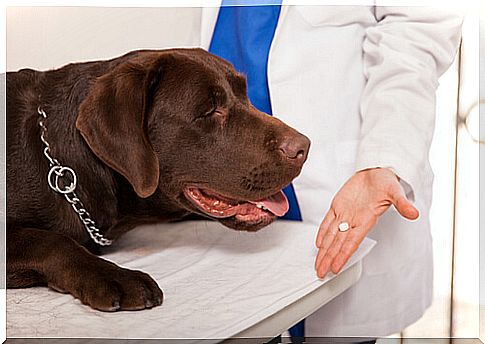The Toxicity Of Ibuprofen In Dogs

A serious mistake often made is giving medicines from humans to dogs. This is the case of analgesics and antipyretics. The dog’s body is different, and without proper medical prescription, medication can be highly dangerous. Among these banned drugs, and most especially, is ibuprofen. Below, we will provide information about the toxicity of ibuprofen in dogs.
Ibuprofen: Why is it a risk?
Who doesn’t have painkillers in the drawer and has already used them in case of discomfort? This is a common practice among humans and is not supposed to pose great risks. However, doing the same with dogs can be highly harmful, possibly even causing the animal’s death.
These are products whose composition was made for the human body. Even in small doses, it can cause problems in dogs.
The toxicity of ibuprofen in dogs has been proven. Medicating the animal with it is a big mistake that can cause problems. Even so, it’s a very common mistake.

Either because they are at hand, because they are drugs more economical than those for animals, or too lazy to schedule a veterinary appointment, use in dogs is very normal.
What You Need to Know About Ibuprofen Toxicity in Dogs
Unfortunately, intoxication with this drug, together with paracetamol and aspirin, is one of the most common poisonings. It is estimated that one in three people give these medicines to their animals. The animal’s organism is very different from the human being, and the way it processes the medicine is also very different. There are certain enzymes in the body that attack medicines. In animals, these enzymes are different, as is the way to eliminate pharmacological substances. This causes many of these substances to remain in the dog’s body. Without properly eliminating them, intoxication is caused.
What happens then? The animal’s body is not prepared to receive and process this type of medicine. Your body does not eliminate toxic substances. This explains why ibuprofen is toxic in dogs.
What problems happen in the dog’s body
The toxicity of these compounds inhibits substances that protect the dog’s stomach walls, as well as blood circulation in the kidneys. Therefore, the main problems appear in these organs.
Everything that the dog’s body retains accumulates, whether in the liver or kidneys. Over time, bleeding, kidney failure and even the animal’s death can occur.
Is there a risk-free dose?
Regardless of the dose applied, the toxicity of ibuprofen in dogs will always be present.
Ibuprofen has an insignificant safety margin in dogs. Half a tablet, for example, given to a 50kg dog, represents a risk and there is the possibility of being toxic. Gastric ulcers, kidney or heart problems may occur. There is also a risk of changes in the nervous system, such as seizures or coma.
The consequences depend on the size of the animal, and sometimes end up being lethal in smaller dogs.
some are allowed
Although some doctors prescribe paracetamol in very small doses, you should always make an appointment with your veterinarian.
The Spanish Agency for Medicines and Health Products establishes which human medicines can be used in dogs with the proper prescription. Ibuprofen is not among those allowed.
The problem is that none of them contain indications about the adequate amount for animals. And it is a mistake to consider that the dose indicated for children is the right one for dogs.
Intoxication symptoms
If the animal ingested ibuprofen, the following symptoms may show possible intoxication:
- Weakness
- Somnolence
- Nausea and vomiting
- Cramps
- Diarrhea
- dark stools
- Renal insufficiency

Advices
Finally, these recommendations are helpful:
Never give medicines for human use to animals, even if it seems like an insignificant dose.
Keep bags of medication out of the dog’s reach.
In the face of any illness, consult a veterinarian. The specialist will indicate the suitable remedies for the animal, the appropriate dose and for how long it should be given. If you are a trustworthy professional, even a phone call will do.
If any symptoms appear, take the animal to the veterinarian urgently so that the corresponding measures can be taken. It could be an intoxication.









